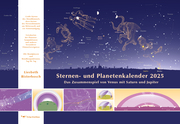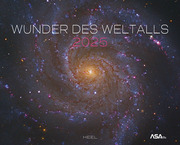Bode's Law and the Discovery of Juno (E-Book, PDF)
Bode's Law and the Discovery of Juno
eBook - Historical Studies in Asteroid Research
Bibliographische Informationen
Format: Digitale Rechteverwaltung: Digitales Wasserzeichen
Beschreibung
Johann Bode developed a so-called law of planetary distances best known as Bodes Law. The story of the discovery of Juno in 1804 by Karl Harding tells how Juno fit into that scheme and is examined as it relates to the philosopher Georg Hegels 1801 thesis that there could be no planets between Mars and Jupiter. By 1804 that gap was not only filled but had three residents: Ceres, Pallas and Juno!
When Juno was discovered no one could have imagined its study would call into question Newtons law of gravity, or be the impetus for developing the mathematics of the fast Fourier transform by Carl Gauss. Clifford Cunningham, a dedicated scholar, opens to scrutiny this critical moment of astronomical discovery, continuing the story of asteroid begun in earlier volumes of this series.
The fascinating issues raised by the discovery of Juno take us on an extraordinary journey. The revelation of the existence of this new class of celestial bodies transformed our understanding of the Solar System, the implications of which are thoroughly discussed in terms of Romantic Era science, philosophy, poetry, mathematics and astronomy.
The account given here is based on both English and foreign correspondence and scientific papers, most of which are translated for the first time.
Autorenportrait
Inhalt
E-Book Informationen
„eBooks“ sind digitale Bücher. Um eBooks lesen zu können, wird entweder eine spezielle Software für Computer, Tablets und Smartphones oder ein eBook-Reader benötigt. Da es eBooks in unterschieldichen Formaten gibt, gilt es, folgendes zu beachten.
Von uns werden digitale Bücher in drei Formaten ausgeliefert. Die Formate sind EPUB mit DRM (Digital Rights Management), EPUB ohne DRM und PDF. Bei den Formaten PDF und EPUB ohne DRM müssen Sie lediglich prüfen, ob Ihr eBook-Reader kompatibel ist. Wenn ein Format mit DRM genutzt wird, besteht zusätzlich die Notwendigkeit, dass Sie einen kostenlosen Adobe® Digital Editions Account besitzen. Wenn Sie ein eBook, das Adobe® Digital Editions benötigt, herunterladen, erhalten Sie eine ASCM-Datei, die zu Digital Editions hinzugefügt und mit Ihrem Account verknüpft werden muss. Einige eBook-Reader (zum Beispiel PocketBook Touch) unterstützen auch das direkte Eingeben der Login-Daten des Adobe Accounts – somit können diese ASCM-Dateien direkt auf das betreffende Gerät kopiert werden.
Da eBooks nur für eine begrenzte Zeit – in der Regel 6 Monate – herunterladbar sind, sollten Sie stets eine Sicherheitskopie auf einem Dauerspeicher (Festplatte, USB-Stick oder CD) anlegen. Außerdem ist die Anzahl der Downloads auf maximal 5 begrenzt.
Andere Artikel von "Cunningham, Clifford J"
Lieferbar innerhalb ca. einer Woche

Lieferbar innerhalb ca. einer Woche

Lieferbar innerhalb ca. einer Woche

Lieferbar innerhalb ca. einer Woche

Weitere Artikel aus der Kategorie "Physik, Astronomie/Astronomie"
Neuerscheinung

Neuerscheinung









